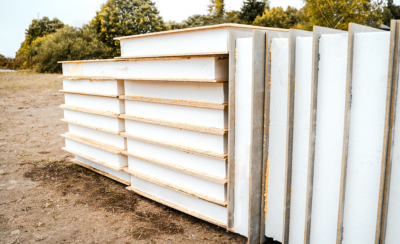SIPs and your self-build property

What are the advantages of using Structural Insulated Panels in self-builds?
Self-builders use Structural Insulated Panels (SIPS) as an alternative to brick and block walls. SIPs are growing in popularity and are currently used in around 8% of all self-builds. SIPS are popular because they speed up the self-build process, enabling self-builders to complete projects earlier. However, the range of different SIPS is broad, offering a range of different benefits, so here are some considerations when planning to use SIPs in your self-build property.
How might SIPs affect self-build insurance?
It's vital to have self-build insurance in place from day one because it protects against theft, vandalism and accidents. Self-build insurance covers the cost of materials, equipment and liability claims arising from construction activities. Self-build site insurance protects the works, existing structure, and rest of the property and should organised once you've exchanged contracts and before work starts on site.
It is essential to consider your insurance when planning every stage of your self-build property, including when selecting building materials. Recent studies show that selecting SIPs made with additional fire-resistant materials and assembly methods may improve the overall fire safety of the property.
What are the advantages?
SIPS are not only attractive because they bring speed to a self-build project, but they also offer several other benefits, including:
 wider spacing between the wall studs offers improved insulation performance
wider spacing between the wall studs offers improved insulation performance
 factory-made SIPs are cut more accurately than on-site cut timber frames, making them more airtight
factory-made SIPs are cut more accurately than on-site cut timber frames, making them more airtight
 strong enough to not require traditional roof trusses
strong enough to not require traditional roof trusses
 faster construction times
faster construction times
SIPS and Building Regulations
SIPS comply with the Building Regulations 2010, which covers the safety, health, and efficiency of buildings.
Part A (Structural Safety): SIP panels are rigorously tested to ensure they meet building stability standards.
Part L (Conservation of Fuel and Power): SIPs have an insulation core that significantly reduces heat loss and energy consumption.
Part B (Fire Safety): SIPs comply with UK fire safety regulations, but some are more fire resistant than others.
Part E (Resistance to Sound): SIP panels are excellent soundproofing materials for residential and commercial buildings.
SIPs are an essential part of the planning process for your next self-build project, not only because they form the structural shell of the property but also because they can improve the overall performance of the building. SIPs are popular because they tick all the right boxes in terms of UK Building Regulations, budgets, and time, but it is important to carefully choose a product that reduces all the risks.